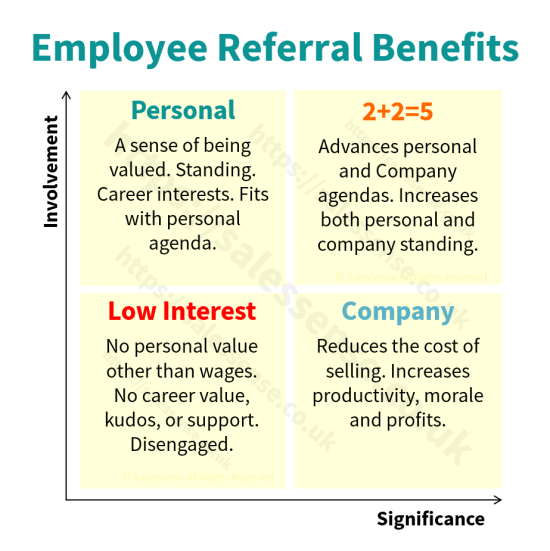Do your employees have referral opportunities?

You may already offer recruitment referral incentives. Might your employees know people who work for potential customers? Since everyone knows about 100 people, incentivising employee referrals of new customers is likely to produce some results.
Depending on the types of employees you have, this may take some patience, encouragement, and incentives.
Employees can't say no but can feel uncomfortable and avoid doing what you ask. Use the following steps to develop a customer referral programme for employees.
Encourage your people to use LinkedIn.
The better networked your employees and the more active networkers they are, the easier it will be for you to leverage social media.
Communicate the career benefits and advantages of having a strong professional network.
Show them how to create an appealing LinkedIn profile page.
Get professional photos taken that are suitable for use in their profiles.
Invest in training to explain how LinkedIn works and how to use it.
Respect the few who have an issue with putting their career face online.
Encourage connections with those who work for suppliers, business partners, and customers.
You might consider getting paid subscriptions for your sales and marketing people.
Introduce Incentives
After a few months of encouragement, start a low-key incentive programme for employee referrals resulting in new customers.
Small rewards are better.
Large rewards can be misunderstood and may lead to abuse.
To begin with, make it a trial.
Give your employees some help by profiling ideal customers.
Could this work for you?
Do you need some extra resources to make it happen?
Schedule an informal conversation with Clive Miller or call +44 1392 851500.
Here is a detailed guide for getting employee referrals:
Employee referrals for new customers involve encouraging employees to recommend potential new customers to the company. This strategy leverages the personal and professional networks of employees to expand the company's customer base. Here are the key aspects of such referral programs:
How Employee Referrals for New Customers Work
Referral Program Design: Companies establish formal programs where employees are incentivised to refer new customers. This may include providing information about the company’s products or services to their contacts. Content pieces are often suitable for this purpose. See content referrals here.
Incentives: Employees receive rewards for successful referrals. These rewards can be monetary bonuses, discounts, gift cards, or other perks. Small rewards are often better than large rewards. Contributing to the success of the company is a reward in itself. Those who contribute most in this way, are often rewarded indirectly.
Submission Process: Employees can refer new customers through a dedicated platform, form, or via email, providing contact information and details about the potential customer.
Follow-Up: The company then follows up with the referred potential customers to introduce them to their products or services and attempt to convert them into paying customers. If employees know the contact, personally include them in the initial meeting.
Benefits of Employee Referrals for New Customers
Expanded Customer Base: Employees can help tap into networks that may not be reachable through traditional marketing channels, leading to new customer acquisitions.
Trust and Credibility: Recommendations from employees often carry more weight as they come from trusted sources, increasing the likelihood of conversion.
Cost-Effective Marketing: Referral programs that leverage the networks of employees can reduce the need for expensive marketing campaigns.
Employee Engagement: Involving employees in the customer acquisition process can boost their engagement and sense of contribution to the company’s growth.
Implementation of Employee Referral Programs for New Customers
Clear Guidelines: Establish clear guidelines on how the referral process works, what qualifies as a successful referral, and the rewards offered.
Communication: Regularly communicate the program’s details and benefits to all employees to ensure widespread participation.
User-Friendly Process: Make the referral process simple and easy to use, providing necessary tools and support for employees.
Tracking and Recognition: Implement a system to track referrals and recognise employees who successfully refer new customers.
Challenges and Considerations
Quality Control: Ensure that referred customers are genuinely interested in the company’s offerings to avoid wasting resources on low-quality leads.
Program Management: Regularly review and adjust the program to ensure it remains effective and attractive to employees.
Balance: Maintain a balance between relying on employee referrals and using other marketing and customer acquisition strategies to ensure a diverse and robust customer base.
Example Scenarios
Software Companies: Employees can refer friends or acquaintances working in businesses that might benefit from the company’s software solutions. Successful referrals leading to new business clients can result in rewards.
Retail and Services: Employees might refer friends or family to try out a new product line or service, earning discounts or bonuses if the referrals make purchases.
B2B Services: Employees in industries like consulting or finance can refer professional contacts from other companies who might need similar services, with successful client acquisitions leading to incentives.
In summary, employee referrals for new customers are a little-used way of leveraging the networks of existing employees to grow the customer base. By providing incentives and making the process straightforward, companies can use this approach to enhance their marketing efforts and drive business growth.
This is the fifth of 17 referral prospecting methods shared on this site. See the others here.
If you want to use employee referrals to win more new customers, we can help. Call +44 (0)1392 851500. Alternatively, use the contact form here or send an email to jimm@salessense.co.uk.












